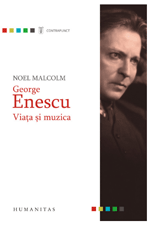> [Archived] Books about music

'George Enescu - his life and music' by Noel Malcolm
Music requires first of all a respectful silence in which to listen to it. But after listening to it - or before knowing it - words can bring you even closer to it. Here's an argument in favour of a moment dedicated to books about music. For a start, I've stopped - naturally, I would say - on a volume released during the Enescu Festival, which has recently ended, a book about the very patron of the festival - George Enescu - the life and music of George Enescu.
Those who have already read books from the Contrapunct (Counterpoint) collection of the Humanitas Publishing House know that these books are especially written so as to be easily understood by the general public - therefore I read the book of the British expert in Enescu - as the publishing house itself recommends him - from the perspective of a non-specialist. And I have rediscovered George Enescu from the perspective of an author who is obviously in love with Enescu's music - and I quote - "I agree with Casals' statement that Enescu, through the depth and the broad reach of his abilities, was the greatest musical phenomenon since Mozart. From this point of view, Enescu's entire work may seem painfully modest. However, I believe that within it is one of the most beautiful and surprising music of the 20th century" - end quote.
Answers to unanswered questions
I have searched for answers in Noel Malcolm's book that I couldn't find in Romanian books about George Enescu - why his music did not prevail with as much force as his contemporaries' from other ex-communist countries, what happened to Enescu after he left Romania in 1946 - the monograph of the Romanian Academy tackles the period in Enescu's life after 1946 in a very brief and elliptical chapter. And even what Enescu thought about the experimental music written by some of his contemporaries.
And here is what Noel Malcolm states: "Here is a man whose maturity compositions, above all the chamber music he wrote in the latter part of his life, may be compared to the best works by Bartok and Ravel. And still, these works remain practically unsung in the West. Record stores in Western Europe are filled with Czech, Hungarian and Polish recordings. This fact has contributed enormously to the recent establishment of the reputation of certain composers, such as Martinu and Szymanowski. However, no Western importer has ever been able to obtain the regular delivery of recordings from Romania. As far as scores are concerned, the experience I went through when I attended the symposium dedicated to the centennial of Enescu, in Romania, in 1981, may serve as an example. At the main store that held musical articles in Bucharest, the only scores I could find were one of a lied he had composed in his youth and one of the cadence written by Enescu for Brahms' violin Concerto."
"Music has to reach the heart"
Noel Malcolm - the book about George Enescu and a new quote: "Enescu couldn't stand the music he felt was modernist for the sake of modernism, nor could he stand that music be subjected to cerebral compositional techniques... He spoke more straightforwardly when, on his deathbed, he told Sergiu Comissiona: «All this dodecaphonic music... tell them, tell them this is not music! Music has to go from one heart to another.»"
As far as Enescu's life after 1946 is concerned - those who will read Noel Malcolm's book will discover the sad reality that Enescu passed away in misery - the reasons that led to this situation being manifold: the Cantacuzino family - Enescu had lost his properties and his savings when the communist regime came to power in Romania; Enescu was ill, so he couldn't take his violin and set off on tours anymore, as he had done in his youth. On the other hand, Enescu did not accept the help of his friends, especially the one offered by Yehudi Menuhin - probably out of a feeling of pride easily understandable for a personality of his size. Furthermore, his wife, Maruca Cantacuzino, adapted with difficulty to life in exile, obviously less comfortable to what she had been used to - spending more than the family budget could afford.
Of course, Noel Malcolm's book about Enescu, who first appeared in Great Britain in 1990, offers much more data, with details about Enescu's works and information about Enescu - the performer.
For the generation of those my age, who learned about Enescu in school, from the nationalistic perspective of communism, Noel Malcolm's book is an opportunity to rediscover Enescu as he was - an extraordinary personality that we should pride ourselves with everyday, not just on the occasion of the Enescu Festival.
Translated by Oana Badea
MTTLC, University of Bucharest














